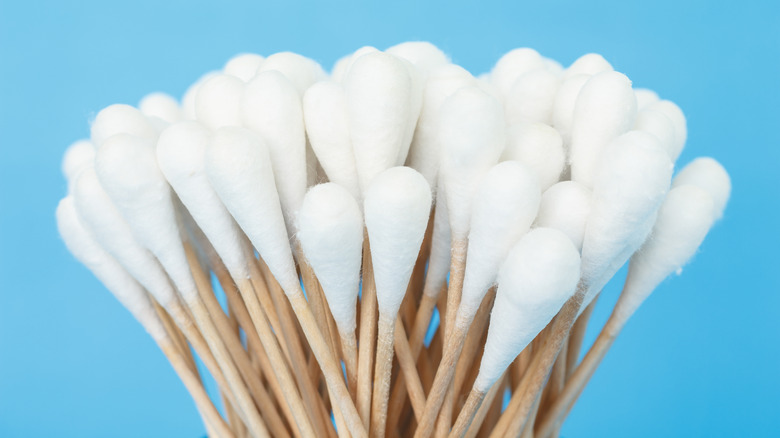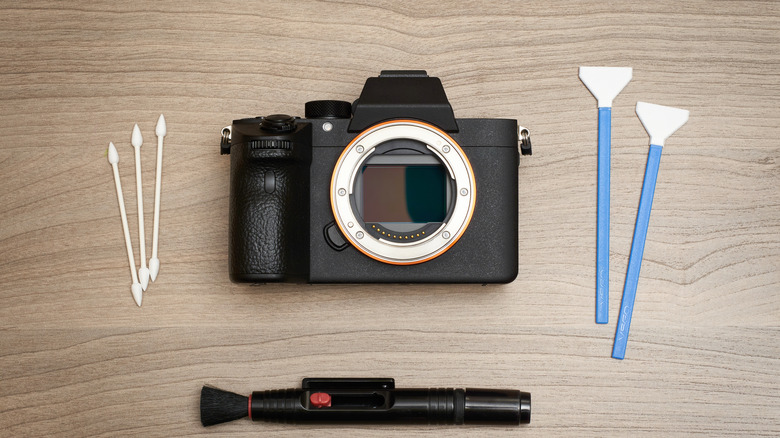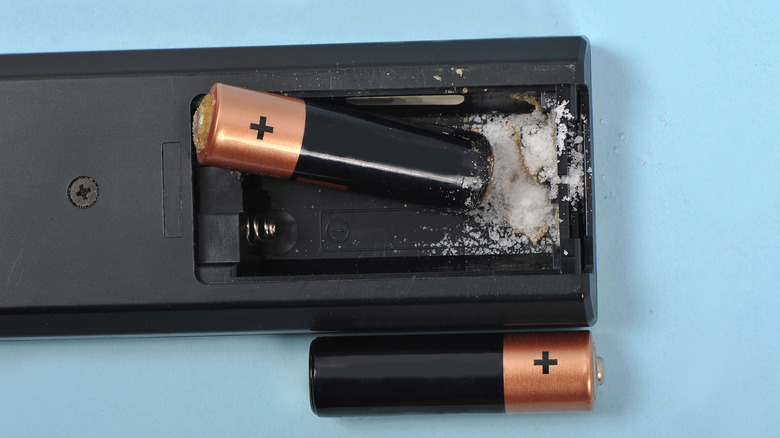The Most Important Place To Use A Q-Tip That You're Probably Missing
Q-tips, those familiar cotton buds on sticks, have hundreds of uses beyond cleaning wax-filled ears. A make-up staple, and also handy for removing stains and touching up scratches, the swabs have another important function overlooked by many: Q-tips are a valuable and effective tool for cleaning your home electronics, including keyboards, gaming consoles, remote control devices, digital cameras, and earbuds. They are also perfect for removing leaking harmful acid from any manner of battery-powered gizmos.
The cotton swabs are unique in their ability to reach into crevices and access other hard-to-reach areas due to their diminutive tips, which are only 0.2-inches in diameter and tightly packed, according to Honeywell. The inspiration for Q-tips (the "Q for Quality") dates back to 1923, when Polish inventor Leo Gerstenzang noticed his wife cleaning their baby's ears with a cotton-wrapped stick. They were introduced commercially as Baby Gays, and gradually evolved into today's go-to ear-cleaners. Ironically, doctors oppose this grooming function on safety grounds, per The Washington Post, and they would undoubtedly prefer the swabs be put to use cleaning computers and other electronic equipment rather than ear canals.
Q-tips and electronics
Forget about cleaning your ears with Q-tips. Use them instead to clean and maintain keyboards, cameras, remote control equipment, hand-held video games, earbuds, or even a wireless mouse. The cotton-on-a-stick wonder tools can also remove residue from a cellphone's battery contact points and its charger for a better connection, as Mental Floss suggests.
A laptop's keyboard is riddled with germs, dust, and skin oil. Per Gear Patrol, a Q-tip saturated in isopropyl (rubbing) alcohol is ideal for cleaning and sanitizing the tops of its keys and the grooves between them. Every two weeks, turn off the device, remove the batteries, and unplug the keyboard if applicable. Then use a coffee filter to dust it off. Next, dip Q-tips in the alcohol and get to work on all the dust-filled crevices. This deep cleaning won't even damage the letters on the computer's keys.
Displeased with the sound quality of your earbuds? Q-tips will help restore them to your satisfaction without ruining them. To start the process, remove the ear covers. A dry swab, or one dampened with diluted soap and water, can be used to safely remove the built-up earwax that was impeding the sound. According to Adorama, a tiny amount of isopropyl on a Q-tip will efficiently clean the mesh screen covering the earbuds' drivers. Be sure to hold the mesh face down as you probe so the trapped debris will fall out.
Save electronics from battery acid
Your electronics are vulnerable to aging and leaking batteries. According to Review Geek, as alkaline batteries wear out, their casing will eventually rupture and cause potassium hydroxide to escape. The device itself will be soiled, and its inner workings will be threatened by the nasty white substance. After the batteries have been safely thrown away, Q-tips will come to the rescue yet again. Most battery compartments can accommodate the tiny swab, making it uniquely suited to access the metal contacts and circuitry within, in order to clean them.
Per Energizer, the potassium hydroxide must first be neutralized by dipping a Q-tip into mildly acidic white vinegar or lemon juice and applying it to the spilled battery contents. Note: Although it's referred to as battery acid, the potassium hydroxide is actually an alkaline base. The battery connection can be removed and cleaned separately, and then the device's interior can be worked on. Wipe and remove what you can of the pasty residue with the help of some Q-tips.
For the most pristine results, soak a clean Q-tip in isopropyl alcohol and touch up the battery compartment before reassembling the device. Potassium hydroxide is corrosive and exposure can be harmful, so care should be taken when handling it. This includes wearing rubber gloves, goggles, and a mask, as you might have to pry the ruined batteries loose, warns Digital Trends.


